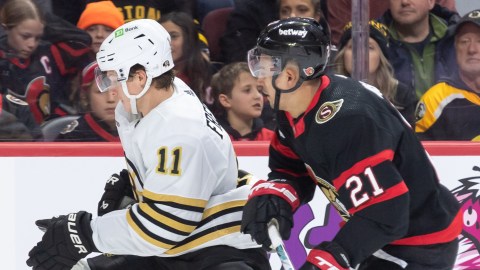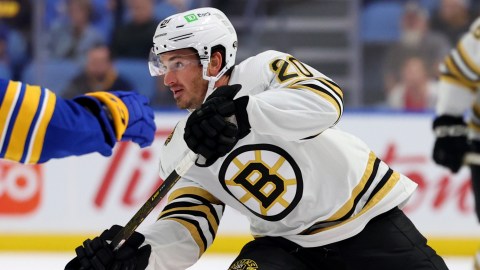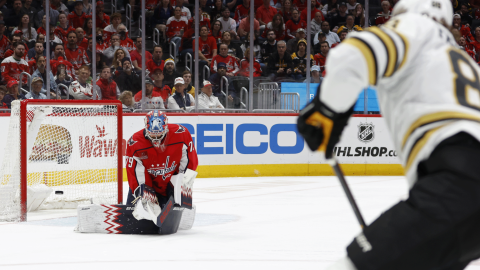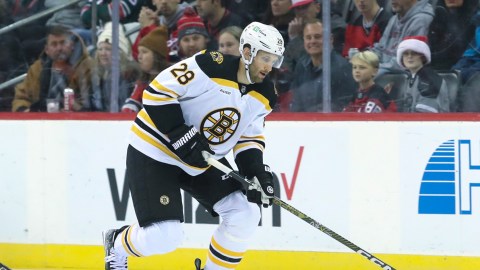Let's face it, no hockey fan has ever seen a referee's call that he agrees with. At least not one that comes against their team.
Players and coaches aren't typically big fans of the guys in stripes either, though league fines usually force them to keep their opinions to themselves.
Complaints about officiating have been a constant since the NHL first formed in 1917, but the rumblings about the state of the league's officiating seem to be growing ever louder of late.
Here in Boston, there was plenty to be upset about last Saturday when Milan Lucic was erroneously ejected for leaving the bench to join a scrum against the Canucks. Video replays showed that Lucic was on the ice legally and the game misconduct was later rescinded, but that did little to help the Bruins, who had to play the final 56 minutes of the game without their top-line left wing and ended up losing by a goal.
Vancouver scored one of its goals on the 5-on-3 advantage that resulted from that scrum, an even more egregious set of calls after both teams participated equally in that little bit of mayhem. Alexandre Burrows' swat with his stick up around Shawn Thornton's face, the fact that Vancouver had several extra players on the ice and others reaching over from the bench and a half dozen players piling on Thornton were all missed by referees Don VanMassenhoven and Dan O'Rourke, who gave the extra penalties instead to Lucic and Thornton.
Thornton was also called for a phantom illegal check to the head penalty Tuesday against Winnipeg despite not actually making any contact to Chris Thorburn's head. Referee Greg Kimmerley later apologized to Thornton for the bad call.
"Honestly, when [Kimmerly] put his arm up I didn't know what the call was," Thornton said after the game. "But he admitted he had messed up the call, he apologized. From the angle he was at, he said he thought I made contact with his head. Mistakes happen. Obviously, I wasn't happy with it, but he admitted it and he's a veteran ref, so you give him the benefit of the doubt most of the time."
But mistakes have been happening an awful lot of late. This isn't a provincial complaint, as every team has been affected at different points. The Bruins have benefited at times, such as a play in Columbus in December when Blue Jackets forward Derek Dorsett was called for goalie interference when he legally drove to the net with the puck.
On hockey's biggest regular-season stage, the Rangers overcame some dubious officiating to beat host Philadelphia 3-2 in the Winter Classic on Jan. 2. Trailing by a goal, the Flyers got a power play in the final minutes when Rangers defenseman Ryan McDonagh was called for delay of game for knocking the net off its moorings despite being shoved into the cage by Philadelphia's James van Riemsdyk. Moments later, a New York power play was negated as Ryan Callahan was also called for holding the stick when he reached up to protect himself from a Kimmo Timonen high hook and McDonagh was called for closing his hand on the puck in the crease to give the Flyers a controversial penalty shot with 20 seconds to play.
"I'm not sure if NBC got together with the refs to turn this into an overtime game," Rangers coach John Tortorella said after the game. "They're two good referees [Ian Walsh and Dennis LaRue], but I thought that game was reffed horribly. I'm not sure what happened there. Maybe they wanted to get it to an overtime. I'm not sure if they had meetings about that or what. … I just thought tonight, in that third period, it was disgusting."
Tortorella later apologized and was fined $30,000 for his comments, but there were plenty around the league that sympathized with his feelings.
So what can the NHL do about its growing problem of sub-par on-ice officiating? The ideal solution would be to scrap the two-referee system. That wouldn't end bad calls by any means, but it would at least produce greater consistency within each game.
The league began phasing in the two-ref format during the 1998-99 season, and since 2000-01 all games have been played with two referees. But just as many have complained about the quality of play declining due to expansion watering down the talent pool for players, doubling the amount of referees simply brought in many officials not ready for the responsibility of running a game at the sport's highest level. Even more than a decade later, the quality of officiating is compromised by the need to employ so many additional referees.
The two-ref system also leads to more inconsistency, as each ref has his own interpretation of how much leeway will be allowed within the game. The same hit in the same game can produce a penalty call at one end of the ice and nothing at the other depending on which ref has the call. There's also a natural inclination for refs, especially the less experienced member of a pairing, to feel the need to look for calls to make if his partner has already whistled several in a row.
Adding to the inconsistency is the fact that unlike baseball's umpiring crews, NHL refs do stay together as consistent pairings. New combinations are thrown together each game, so the refs have to constantly learn the tendencies of new partners, and players and coaches never know exactly what to expect from game to game.
Unfortunately, the league isn't likely to abandon the two-ref system any time soon. Just as the NHLPA would battle tooth and nail against contraction to protect its members' jobs, so too would the Officials Association draw the line against such a rollback.
There are other options that could help, though. Perhaps assigning refs to work as pairs throughout the season, or even as four-man units with the same linesmen, could help improve the overall consistency of the officiating.
The league could also explore the expansion of video review, allowing the war room in Toronto to correct mistakes such as Lucic's ejection or the play earlier this season when Islanders defenseman Travis Hamonic was tossed for an elbowing major against Pittsburgh's Brooks Orpik, but replays revealed that it was actually Orpik's own stick that had cut him. If not the folks back in Toronto, then maybe allowing a coach's challenge on certain calls like in the NFL could offer some immediate redress for mistakes on the ice.
Referees are human. Like the players and coaches, they are going to make mistakes, and there is nothing that will completely eliminate bad calls. But the number of those erroneous calls appears to be growing exponentially, and the league needs to do something to reverse that trend. If the NHL can't rely on its referees to set a level playing field, then true chaos is sure to follow.
"Can it get frustrating for players? I think so," Bruins coach Claude Julien said earlier this week. "At one point you say, 'What do I have to do to be able to stay in the game?' We have to be careful with that. We've got to all work together to make sure as people in this league to make sure that we do the right thing for everybody."
Have a question for Douglas Flynn? Send it to him via Twitter at @douglasflynn or send it here. He will pick a few questions to answer every week for his mailbag.



